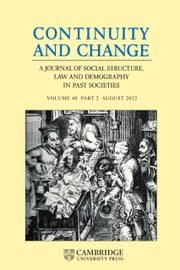Article contents
Law, the ‘commune’, and the distribution of resources in early modern German state formation
Published online by Cambridge University Press: 06 November 2002
Abstract
This article examines a series of disputes that developed among villagers in the Duchy of Württemberg in south-west Germany during the sixteenth and early seventeenth centuries, disputes that were appealed to higher courts and became a matter for decision by the Duchy's ruling council. The disputes concerned the allocation of free wood from communally owned woodlands, and the size of shares permitted to particular groups, but developed into arguments over the nature of communal government and the authority of custom. They provide avenues to the understanding of the development of intra-village tensions, and to how disputes over resource allocation could erupt at particular instances, drawing higher echelons of state authority into the resolution of essentially local problems. In doing so the article seeks to provide a corrective to simplistic explanations of why resource regulation occurs at particular junctures, and contributes to a history of state formation, the village commune and legal change, giving proper place to pressures ‘from below’ as well as government intervention.
- Type
- Research Article
- Information
- Copyright
- © 2002 Cambridge University Press
- 6
- Cited by


